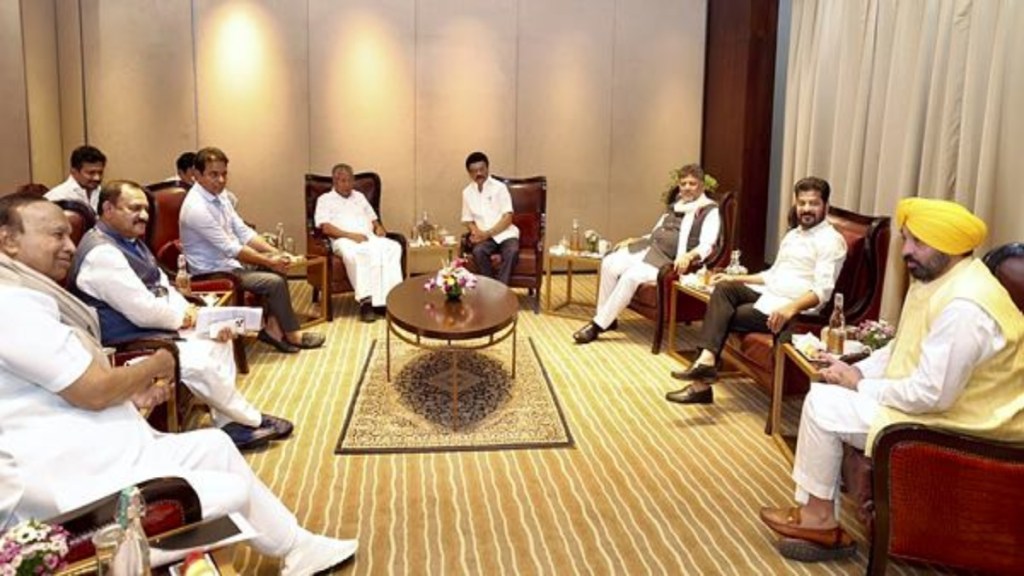The Joint Action Committee (JAC) on Saturday passed a resolution expressing serious concerns over the “lack of transparency and clarity” from the Union government regarding the delimitation of Parliamentary constituencies. The JAC unanimously demanded that the freeze on Parliamentary constituencies based on the 1971 Census population be extended for another 25 years.
Call for ‘fair’ delimitation
The resolution emphasised the need for a transparent delimitation process that involves all stakeholders, including political parties, state governments, and other relevant entities. “Any delimitation exercise carried out by the Union Government to improve the content and character of democracy should be conducted transparently, enabling all stakeholders to contribute,” the resolution read.
Highlighting the legislative intent behind the 42nd, 84th, and 87th Constitutional amendments, the JAC argued that states which have successfully implemented population control measures should not be penalized. The JAC also resolved to encourage political parties from different states to introduce appropriate Legislative Assembly resolutions on the issue.
The first JAC meeting, called by Tamil Nadu Chief Minister M K Stalin, was held in Chennai and attended by several prominent leaders, including Karnataka Deputy Chief Minister D K Shivakumar, Telangana Chief Minister Revanth Reddy, Punjab Chief Minister Bhagwant Mann, Kerala Chief Minister Pinarayi Vijayan, and other political leaders from Odisha and West Bengal.
Key takeaways – Who said what
During the meeting, Kerala CM Pinarayi Vijayan expressed concerns that the delimitation exercise was driven by narrow political interests rather thlikened the delimitation proposal to the “Sword of Damocles” hanging over the southern states.an democratic imperatives. He alleged that the BJP government was moving ahead without proper consultation, potentially reducing representation for southern states.
Vijayan says, “Our states are now set to be punished precisely for our sincere implementation of the National Population Policy of 1976.”
Sword of Damocles is an ancient Roman moral tale illustrating the constant anxiety that comes with power. In the story, King Dionysius allows a man named Damocles to experience the lavish life of a king. However, he suspends a sharp sword above Damocles’ head, held by a single strand of horsehair. This vivid image serves as a powerful reminder that great power is often accompanied by ever-present danger and uncertainty.
Telangana CM Revanth Reddy echoed similar sentiments, warning that population-based delimitation would diminish the political voice of southern states. “BJP is implementing the policy of demographic penalty. We are one country, we respect it. But, we cannot accept this proposed delimitation because it will politically limit us and it will punish us for being a performing state,” said Reddy.
Karnataka Dy CM D K Shivakumar also accused the Centre of attempting to reduce southern states’ Parliamentary representation.
CM Stalin proposed setting up an expert panel to develop a political and legal action plan under the JAC for fair delimitation. He stressed the importance of continuous action to ensure the rights of the states are upheld. “Our representation must not decline,” Stalin said.
NCP (SP) leader Supriya Sule highlighted the need for fair delimitation of Parliamentary constituencies. She praised southern states for their effective population management and social sector performance. Sule expressed concern over the lack of clarity on delimitation and stressed the importance of fairness. She confirmed her party’s engagement with the DMK-led Joint Action Committee of southern states.
Congress MP Jairam Ramesh emphasized that delimitation cannot proceed without a fresh census, highlighting a constitutional amendment made by former Prime Minister Atal Bihari Vajpayee in 2002. The amendment postponed delimitation until after the first census post-2026, likely in 2031, keeping constituency boundaries frozen at 1971 population levels. Speaking to ANI, Ramesh questioned the delay in conducting the census, stressing its importance for women’s reservation and Lok Sabha seat distribution. He warned that states successful in family planning risk losing parliamentary representation, calling it “unacceptable” and advocating for fair representation without penalising population control efforts.
BJD president Naveen Patnaik stressed that population should not be the sole criterion for determining Parliament seats. He urged the Union government to hold detailed discussions with all parties, emphasizing the need to protect Odisha’s interests. Patnaik warned that population-based delimitation would unfairly penalise states prioritising population control. “Our stand is that population should not be the only criterion to determine the number of seats in the highest representative body of our country,” Patnaik added.
BRS working president KT Rama Rao underlined two key points on delimitation. Firstly, he proposed increasing MLA seats in every state for better representation. Secondly, he suggested that any increase in Parliament seats should maintain the current proportional distribution. He argued that altering this balance would unfairly penalise states excelling in education, social indicators, population control, and health. “It would be truly unfair to states that performed exceptionally well on every indicator,” he stated, urging a fair and balanced approach.
BJP reactions
The BJP’s Tamil Nadu unit staged a black flag protest against the JAC meeting, with party leader K Annamalai calling it a “drama” and accusing CM Stalin of compromising on key state issues. Former Governor Dr Tamilisai Soundararjan alleged that the meeting was an attempt to divert attention from governance issues in the participating states.
The JAC resolved to hold its next meeting in Hyderabad, Telangana. CM Stalin described the gathering as the beginning of a movement for fair delimitation. “Today will be etched in history as the day when states united to safeguard our federal structure,” he stated on social media.
(With agency inputs)

